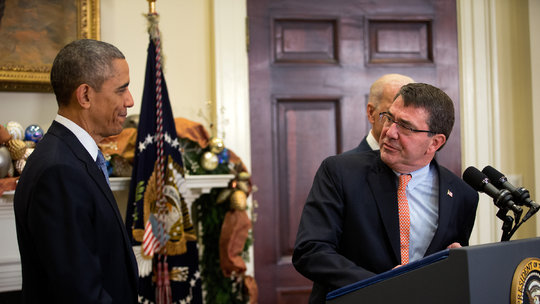WASHINGTON — Ashton B. Carter, the physicist nominated by President Obama on Friday to lead the Pentagon, is in the mold of past cabinet secretaries who have tangled with the White House and may advocate a stronger use of American power overseas.

Assertive and intellectual, Mr. Carter, 60, is in many ways the flip side of Chuck Hagel, the current defense secretary, who was seen as passive and who submitted his resignation under pressure last week. Mr. Carter is more like Robert M. Gates, Mr. Obama’s first defense secretary, who stood up to the White House. The two men are in close touch, and both have a jaundiced view of Washington.
While Mr. Carter very much wanted the top Pentagon job — he was passed over for it two years ago — he once compared working in Washington to being a Christian in the Coliseum. You never know when they are going to release the lions and have you torn apart for the amusement of onlookers.
Mr. Hagel had been expected to appear alongside Mr. Carter, his former deputy, at the White House announcement on Friday, but he was a surprise no-show and instead issued a statement that it was Mr. Carter’s day. His absence reflected his chilly relations with members of Mr. Obama’s national security staff, who described him as largely silent during cabinet meetings, although he also irritated them when he sent a memo to Susan E. Rice, the national security adviser, questioning the administration’s Syria policy.
Ash is rightly regarded as one of our nation’s foremost national security leaders, Mr. Obama said in announcing Mr. Carter’s nomination in the Roosevelt Room, which was filled with the mandarins of Washington’s foreign policy establishment. He was at the table in the Situation Room, he was by my side in navigating complex security challenges.
Mr. Obama paid tribute to Mr. Carter’s record of innovation as a previous top Pentagon official, notably his role in developing and accelerating the shipment of mine-resistant vehicles to American troops in Iraq and Afghanistan. It’s no exaggeration to say there are countless Americans who are alive today, in part because of Ash’s efforts, Mr. Obama said. Mr. Carter, who stood next to Mr. Obama, pledged to keep faith with what he called the greatest fighting force the world has ever known.
After the ceremony, Mr. Carter and Ms. Rice shared a lengthy bear hug.
Despite the display of affection, managing his relationship with Ms. Rice may well be the toughest part of Mr. Carter’s new job. Unlike Mr. Hagel, a former Nebraska senator, Mr. Carter comes to the job with a deep knowledge of a department with a $600 billion annual budget and more than two million uniformed and civilian employees. He worked in the Pentagon in the Clinton administration, returned as the chief weapons buyer under Mr. Gates and then rose to deputy defense secretary, the No. 2 position. He would face virtually no learning curve.
Less certain is whether Mr. Carter, a longtime policy expert and sometime academic, would bring the political skills necessary both for penetrating Mr. Obama’s insular inner circle and for balancing the president’s national security agenda against that of a Republican-led Congress.
Mr. Carter is a Democrat but not one of the core Obama loyalists, a group that includes Ms. Rice and Denis R. McDonough, the White House chief of staff. Like Mr. Gates, Mr. Carter is widely viewed as being to the right of the president on issues like American policy in Syria and the pace of releasing prisoners from the military prison at Guantánamo Bay. Both are issues in which he could come into conflict with Ms. Rice.
Mr. Carter is methodical and sharp, but not necessarily patient. Mr. Obama’s apparent willingness to wait years for the Syrian civil war to play out may frustrate Mr. Carter, who former colleagues say often pushed for clarity in policy goals — and then moved swiftly to pursue those goals.
I would not call him a hawk, said William J. Perry, a defense secretary under President Bill Clinton and one of Mr. Carter’s mentors. But he is pretty hard-nosed about what can be done with American power, and he is willing to use it when appropriate.
Vikram J. Singh, who worked under Mr. Carter when the latter was deputy defense secretary, agreed with that assessment. Ash Carter will probably be very cleareyed about looking at the risk of a set of options, and accepting a certain amount of risk, and moving forward to implement as efficiently and quickly as possible.
If Mr. Carter ends up to the right of Mr. Obama on Syria and the fight against the Islamic State, it will not be the first time. Former aides and administration officials say that Mr. Carter — like Mr. Hagel and Secretary of State John Kerry — was shocked last year when Mr. Obama, after a walk and talk on the South Lawn of the White House with Mr. McDonough, decided at the last moment to call off military strikes against the Syrian president, Bashar al-Assad, who had charged across Mr. Obama’s own red line on the use of chemical weapons.
Now, Mr. Carter will inherit a military strategy that has made some progress in reversing the gains of the Islamic State in Iraq, but has made dealing with Mr. Assad a less important issue. Despite public shows of solidarity, the United States and its partners cannot agree whether their primary enemy in Syria is the Sunni militant group or Mr. Assad.
Mr. Carter must also deal with an era of mandatory across-the-board cuts in military spending. The biggest issue right now is the budget, said Jeremy B. Bash, a former chief of staff to Leon Panetta, another Obama defense secretary, who is advising Mr. Carter on his nomination.
Mr. Carter is expected to have smooth confirmation hearings from Senate Republicans, who say they foresee no opposition to him.
Born in Philadelphia, Mr. Carter studied medieval history at Yale and earned a doctorate in theoretical physics at Oxford, where he was a Rhodes scholar. In a 2013 interview, he recalled spending time on charmed quarks and also the Higgs boson elementary particle. But then he developed a fascination with defense policy so strong he never pursued a career as a physicist.
In Ash you have a poster child for the guy who discovers that science and technology are the major drivers for some of the most important events in international affairs, and sometimes are the sources of the solutions, said Graham Allison, who recruited Mr. Carter in the early 1980s to come to the Belfer Center for Science and International Affairs at Harvard’s Kennedy School. Here was a guy with a physics background who was fascinated by ballistic missile defense.
Mr. Carter spent the better part of the next quarter-century at the Belfer Center, though he took a leave during the Clinton administration to work for Mr. Perry, a like-minded mathematician and engineer who became defense secretary at a critical moment, after the collapse of the Soviet Union. He quickly became a central player in the 1994 nuclear crisis with North Korea, when the country threw out international inspectors and began what turned out to be a long and successful drive to develop a small nuclear arsenal.
It may have been the closest we came to conflict with North Korea since the end of the Korean War, Mr. Carter once said.
When Mr. Carter was deputy defense secretary, congressional aides recall numerous hearings when Mr. Carter, testifying alongside military commanders and even his bosses, inserted his own answers to questions not directed at him, to make sure he got his point across.
He is not somebody who can simply be counted on, said Anthony H. Cordesman, a national security expert with the Center for Strategic and International Studies. He will say what he thinks.”





